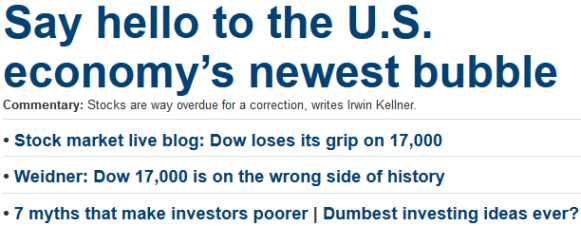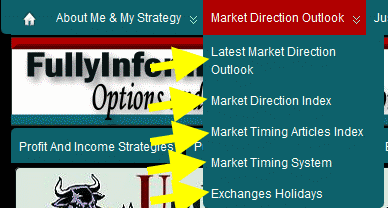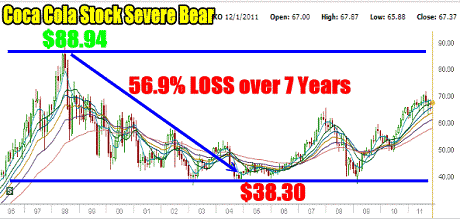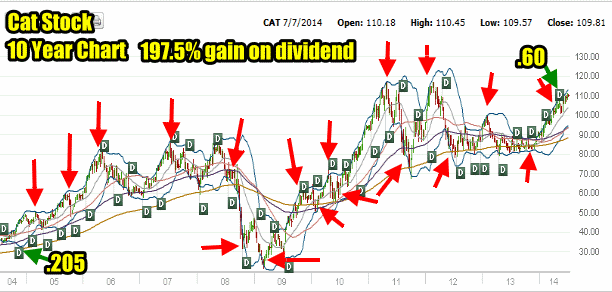 The market direction outlook for today was for weakness and a slightly positive close ahead of the unofficial start of second quarter earnings when Alcoa reports after the markets close today. Instead news out of Europe that the German economy continues to contract has investors worried about US Stocks. With the Dow push just above 17,000 and then a move sideways over the past two trading days, investors have decided to take some profits. The problem here is the growing nervousness as more and more headlines, like the one below from Marketwatch keep investors concerned. With profits up handsomely in the last month and to start off July, investors decided to take some risk back by closing some positions.
The market direction outlook for today was for weakness and a slightly positive close ahead of the unofficial start of second quarter earnings when Alcoa reports after the markets close today. Instead news out of Europe that the German economy continues to contract has investors worried about US Stocks. With the Dow push just above 17,000 and then a move sideways over the past two trading days, investors have decided to take some profits. The problem here is the growing nervousness as more and more headlines, like the one below from Marketwatch keep investors concerned. With profits up handsomely in the last month and to start off July, investors decided to take some risk back by closing some positions.

Headlines like these crop-up on down days which only serve to add to investor worries.
While everyone knows that stocks historically are overvalued in general, the question really is, how well will companies perform in the next quarter. We are about to find out. In general investors are fine with mediocre returns as long as they meet estimates, which again in many cases have been lowered on many stocks. However it is important to also understand the bull side of this market. Three of the strongest factors aside from the accommodative stance of the Federal Reserve which obviously has been the deciding factor for stocks since the crash in 2008 to 2009 are:1) The huge amounts of cash many companies have accumulated in the past 5 years. Many companies, particularly large cap blue chip companies are sitting on mountains of cash. These “mountains” are historically at the highest levels recorded. A large part of this has been caused by the slow return to normal employment conditions as companies benefited from slashing the labor force. The second leading cause is the number of companies that controlled and reigned in overhead costs at the start of the recession.2) The third leading cause of companies building mountains of cash was the re-issue of debt. Long-term debt obligations for most large cap companies has been rewritten at historically low-interest rates. Indeed as the demand for bonds with higher yields has been so strong, many companies were able to issue longer-term debt beyond 5 or even 10 years. This rewrite of debt boosts the bottom line and increases available capital.3) A lot of companies are earmarking some of their mountains of cash to repurchase their own stock which not only increases shareholder value but also slowly reduces the PE Ratios (Price to earnings) of their stocks which allows the stock, over time, to increase in value but maintain a reasonable PE.
The Party Bears Hate
This has resulted in probably the most hated bull market in history. Federal Reserve intervention which started with Ben Bernanke and now continues under Janet Yellen is continually blasted by economists, analysts and many investors alike yet rarely have these “bears” come up with a better plan to have saved the economy. The stance of “let the big banks fail” is foolhardy without any thinking of the eventual outcome of letting pillars of the economy collapse. The belief that wall street is to blame for all the ills of the economy is simplistic thinking. The ills were and still are widespread and reach into almost every facet of the economy from home builders who built far too many homes, to homeowners who over leveraged themselves, to financial institutions that lent without due process of repayment and ridiculous scheduling and all kinds of “tricks” to make debt “affordable” for many who could not afford their obligations. Still though it is easiest to lay blame on one or two groups and banks are an easy target.Since the recovery commenced in 2009 in stocks, the bears have written about the “next shoe” to drop. Indeed even on March 9 2009 with the S&P at 676.53 the doom and gloom crowd warned that this was just the start of what would be a “bear super-cycle” that would wipe out trillions more, destroy pension funds, collapse what was left of housing and see at least another 25% plunge in stocks. For the past 5 years bears have taken every pullback to mean the “second shoe” is finally dropping. What they have missed though is a gain of $1309.06 in the S&P index since that close on March 9 2009.Eventually bears will be right and stocks will suffer a severe correction and then the bears will feel better, but until then these bears have missed unbelievably stellar returns.
Trade What You See
The most important aspect of investing is turning down all the noise, hype and media bombardment and trade what you see happening. I have written many articles explaining that no market in history has collapsed without due warning. On my website in the top navigation bar is the heading Market Direction Outlook. The drop-down that appears offers a variety of articles and indexes. These articles look at everything from warning signs to a variety of systems used to advise what direction stocks are headed both short-term and longer-term. On the USA Members site there is a “Market Trend” link on the lower navigation bar which gives the pros and cons of the medium-term outlook which I use in my daily decision-making process for the trades I place. The medium-term outlook is essential for trading what is happening in the markets.
On the USA Members site there is a “Market Trend” link on the lower navigation bar which gives the pros and cons of the medium-term outlook which I use in my daily decision-making process for the trades I place. The medium-term outlook is essential for trading what is happening in the markets. Using the above tools can assist in reducing the emotional impact of down-days and temper the enthusiasm of up-days. They assist in staying with only trading what is happening in the market, not what “might” happen.
Using the above tools can assist in reducing the emotional impact of down-days and temper the enthusiasm of up-days. They assist in staying with only trading what is happening in the market, not what “might” happen.
Focus On Large Cap Quality Stocks
Stay focused on trading within large cap quality stocks with solid revenue streams of more than just one or two products and who have a more global presence. Analysts and financial planners continually stress the importance of diversification for investors. To them diversification means you should have your capital tied to ETFs or global indexes. They are wrong. The focus should be on companies that have solid roots but a global presence. Coca Cola Stock is one company I continually stress and write about. This is because the company proves the value of investing in a solid company that sells products world-wide. Coca Cola has had troubling times in the past. They have seen their own bear markets and stock devastation. But they continually recover from such declines which makes them ideal for investing. Companies like Coca Cola when they collapse become opportunities, not bottomless pits that you lose your capital in. Looking at the past 10 or 20 years of a company is the eye-opener a lot of investors need. For example, Caterpillar stock below shows that an investor could have bought a small amount of shares at any time, both during collapses and during rises and not only have seen an incredible return on the dividend over a 10 year period, but on the stock itself. By looking back on the history of large cap companies with solid balance sheets and a global presence you can see that collapses are actually opportunities not to be missed. When options are added to the investing strategy being used, the returns are boosted considerably and with patience investors who bought at the “wrong time” can still end up with a large profit, by staying calm and studying the longer term picture of these companies.
Looking at the past 10 or 20 years of a company is the eye-opener a lot of investors need. For example, Caterpillar stock below shows that an investor could have bought a small amount of shares at any time, both during collapses and during rises and not only have seen an incredible return on the dividend over a 10 year period, but on the stock itself. By looking back on the history of large cap companies with solid balance sheets and a global presence you can see that collapses are actually opportunities not to be missed. When options are added to the investing strategy being used, the returns are boosted considerably and with patience investors who bought at the “wrong time” can still end up with a large profit, by staying calm and studying the longer term picture of these companies.
Understand How Small The Stock Markets Are
It is also important for investors to understand that the stock markets as an investment vehicle are small in relation to bond markets and most commodity and currency markets. This means stocks tend to be more volatile and often are far more emotional than other investment type vehicles. When financial planners and brokers advise investors that “options are too risky”, they truly do not understand the stock market at all. It is not options that are “too risky” but stocks. Stocks in general are “risky” and options are what assists in controlling some of the risk of investing in stocks.
The Important Role of Options
Once an investor takes charge of his own portfolio and begins to focus entirely on large cap, globally diversified companies they begin to see how important a role options are, in not just boosting the overall return, but in protecting the capital they have risked in stocks. By controlling risk to capital already earned, investors are boosting their portfolio’s even further. Those investors who buy bonds today and simply hold them until maturing in 10 or 20 years do not understand the effects of inflation. Bonds like stocks are meant to be traded to stay ahead of inflation and grow a portfolio. Instead many investors flee to bonds in the belief that they are “safe” which is far from the truth.For the average individual, investing in stocks through the use of options can grow a portfolio faster and safer, in my opinion, than any other investment and much of the reason for this is because the stock markets are small.
Summary – Understanding Investing In Stocks
To sum up, by understanding the stock markets and how they are perceived by everyone from financial planners to analysts to media pundits, the small investor can begin to see that emotions in trading needs to be set aside to learn how to approach investing, how to select stocks that have a global presence, how to take advantage of downturns and corrections, how to trade what is happening and how to use options to boost and protect portfolios.
Internal Stock and Option Trades Links
Put Selling Strategies For Members
Covered Calls Strategies For Members
Profit And Income Strategies Index
Stock and Option Strategies For Members
Stock And Option Trades Explained For Members
